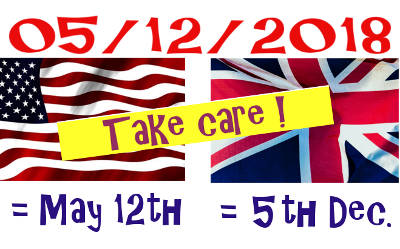

Expressing dates in English
in writing and in speech
Linguapress
- since
1980
Expressing
dates in
English
Numbers
4 : dates
| Other numbers pages : | Numbers - cardinals | Numbers - ordinals | Fractions and decimals |

Lots of differences...
This is a point on which British English and American English differ.When dates are expressed in words, this is not a problem, as the use of full words will identify the date with no possible ambiguity.
Writing dates in figures
When writing dates in figures, it can be vital to know whether one is writing for British (or European) readers or American readers. If there is any doubt, or if one is writing for an international readership, it may be necessary to use words rather than figures, in order to avoid ambiguity.Example:
04/05/2021 means "the fourth of May 2024" in British English
but it means "April fifth 2024" in American English
04/05/2021 means "the fourth of May 2024" in British English
but it means "April fifth 2024" in American English
English grammar
 From
Amazon,
Barnes & Noble, Waterstones and good bookshops
From
Amazon,
Barnes & Noble, Waterstones and good bookshopsWritten and spoken dates
Any date can be written or spoken in several different ways, using figures or a combination of figures and words.It is important to note that in spoken English, dates normally include the words the and of : these are not normally written.
Interestingly, American usage is not consistent. While Americans always write numerical dates using the order Month > Day > Year, America's national holiday, Independence day, is commonly known as '"The fourth of July" or "July Fourth"; and Oliver Stone's 1989 movie is entitled "Born on the Fourth of July".
British speakers may also use the American form as in "May the twentieth", but when writing, the logical order Day > Month > Year is always used.
Years
In both British and American English, years are generally expressed in spoken English as two two-digit numbers. The only exceptions are years ending in -00 to -09
Examples:
2015 Twenty fifteen
2007 Twenty oh-seven (or two thousand and seven)
2000 Two thousand
1995 Nineteen ninety-five
1776 Seventeen seventy-six
The
use of "Two thousand and...." for years following 2000 was common at
the start of the millennium, but has now almost been lost in British
English, and is fading in American English, as Americans return to the
more traditional format.2015 Twenty fifteen
2007 Twenty oh-seven (or two thousand and seven)
2000 Two thousand
1995 Nineteen ninety-five
1776 Seventeen seventy-six
Abbreviating dates
When writing dates, it is common to abbreviate the months of the year to three letters normally followed by a full stop or period. September can be reduced to three or four letters.Jan.
Feb. Mar. Apr. May
Jun. Jul. Aug. Sep. or Sept.
Oct. Nov. Dec.
| Index : | Numbers - cardinals | Numbers - ordinals | Fractions and decimals |
Website
and texts © Linguapress.com 2009 - 2023 except where otherwise
indicated
Contact: Use the form on our get in touch page
Contact: Use the form on our get in touch page

 Copyright
information.
Copyright
information.